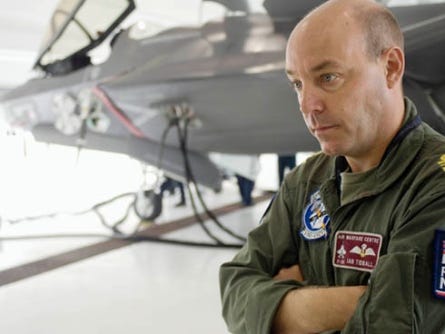
EGLIN AIR FORCE BASE — Last week, the first two United Kingdom pilots started training to fly the F-35.
They join an elite rank. Only 30 pilots in the world have been or are in the process of training to fly the new stealth fighter jet, which is still in testing phases.
“It’s an amazing, once-in-a-lifetime opportunity,” said Royal Air Force squadron leader Franki Buchler, one of the two pilots. “I feel very privileged and lucky. I hope I do the aircraft and the Air Force justice.”
Buchler and fellow pilot, Royal Navy Lt. Cdr. Ian Tidball, have joined the U.S. Marines Fighter Attack Training Squadron 501, which is conducting initial training and instruction on the F-35B at Eglin Air Force Base.
The Air Force is conducting similar training on the F-35A variant.
The U.K. pilots will take academic courses for about six weeks before they go on their first flights.
In addition to the two pilots, 12 aircraft maintainers, two supervisors and their families moved from the United Kingdom to the area to join the Marines and learn about the F-35.
In 2014 this group, along with another pilot and 50-odd more maintainers, are set to head to Edwards Air Force Base in California to stand up their own United Kingdom squadron to test the plane for combat use.
While at Eglin, wing commander Jon Millington, who heads the U.K. group, said he and his men effectively are operating as Marines.
“I told them, ‘You are part of that Marine squad. Embrace it. Enjoy it. You won’t have a chance to be a Marine again,’ ” Millington said.
Buchler said being embedded with the Marine Corps is different than the Royal Navy. He’s been taking part in squad runs and has noticed the Marines require much more physical training time, which he said is a good thing.
“It’s going to get my fitness back into shape,” he said.
He was honored to become a temporary part of the force.
“Just to be around the guys, it’s great,” Buchler said. “They’ve bent over backwards to make us feel that we’re Marines, too.”
The United Kingdom has had a hand — and money invested — in the development of the F-35 from the beginning.
“The F-35 would not be here today if it wasn’t for the U.K.,” said Marine Col. Art Tomassetti.
He said the United Kingdom has the most knowledge on earth about short takeoff and vertical landing capabilities, which the F-35B variant has.
The U.K. has purchased three of the planes, two of which already are at Eglin. The third is expected in February.
For now, those planes are added to the Marine fleet of 11 F-35Bs. The three planes are expected to be flown to the U.K. by 2018.
Millington said the community has been extremely supportive of his men and their families, including the 21 children who were brought to live here while the team trains.
Most have settled in Bluewater Bay, he said.
Royal Air Force Capt. Steven Grant, who graduated from his weapons maintenance course Monday, relocated his wife and 3-year-old son from northern Scotland.
He said it was “a bit of a different climate” in Florida. The family arrived in September when it was still warm enough to go to the beach.
“It’s been very hectic since we got here, but everybody’s been really helpful,” he said. “Everybody we spoke to, they realized who we are. They seemed to know we were coming before we were even here.”
He said many locals invited the families to their homes for Thanksgiving.
Tomassetti said the Marines, the United Kingdom’s Navy and Royal Air Force and the U.S. Air Force have formed a uniquely qualified team with wide-ranging experience to work through initial test phases with the F-35.
“Other than the fact that people are wearing slightly different clothes, it would seem that everybody’s a part of one big operation,” he said.
This article originally appeared on Crestview News Bulletin: First U.K. pilots begin training to fly F-35
